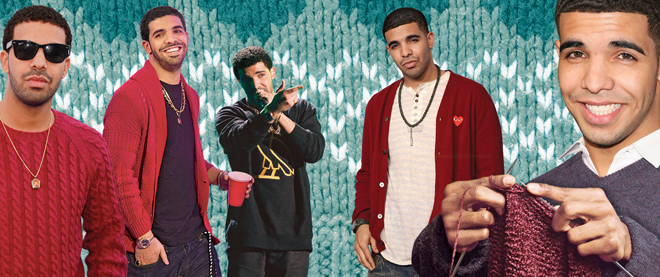Drake opts for sweaters over swagger
The backlash against Drake is not really about his music; it’s about rap fans growing old
CP; Getty Images; Reuters; Photo Illustration by Taylor Shute
Share

In the beginning, there were the sweaters. So many sweaters—maybe as many as a thousand, by one count. There were stylish cardigans and colourful pullovers. Some were striped. One had an owl. But rarely did they ever zip up. “I don’t do zip-up,” the man himself told New York magazine. “Zip-up’s not really my thing.”
The backlash against Toronto rapper Drake, born Aubrey Graham, whose second studio album Take Care topped the Billboard charts in November and earned nearly universal acclaim—one prominent reviewer called it “the glue that binds together all of urban radio”—did not begin with his sweaters. But they make as good a place as any to dive in.
Drake enjoyed massive success after breaking out in 2009. But the hip-hop community never fully embraced him. Many still don’t. And that’s at least partially because of the image his sweaters helped build. More than music, hip hop is a culture, and Drake, a sweater-clad kid from upper-class Toronto, has never totally seemed a part of it.
In that, however, he is hardly unique. Today’s hip-hop world is more fractured and less singular than ever before. Artists from all over the world have bent the music to their own aims, and the culture has become a fluid hybrid of influences.
But Drake, for whatever reason, has become a magnet for a kind of reactionary rap music essentialism. For some fans—wedded to an older idea of what rap is or should be—he is everything hip hop isn’t, and for that he has inspired an almost endless series of everything-was-better-back-in-my-day attacks.
The criticism most often lobbed Drake’s way is that he is “soft,” that he lacks the edge of an earlier generation. This critique is at least partly biographical. Drake grew up in a good neighbourhood. He is Canadian and Jewish, and he became famous first for playing a wheelchair-bound teenager on Degrassi: The Next Generation. He is not, in other words, from the same world as N.W.A. or Tupac Shakur.
Since breaking into the mainstream, Drake has also refused to shy away from the stranger aspects of his personality. The sweaters are part of that. Since wearing a baggy Missoni number to the MTV Video Music Awards last August, the sweaters have become a legitimate thing. Interviewers ask about them. Blogs are dedicated to them. Drake even mocked them on Saturday Night Live. (He also has an obsession with smell. “[My] dream, my goal, is to form a fragrance-and-lifestyle line—like candles, incense, room spray,” he told one interviewer.)
That style—complicated and less aggressively masculine than traditional hip hop—bleeds into his music. On his albums, Drake is often introspective and emotional. His rapping sometimes drifts into song. Critics of his early work say he was a poor MC, that his rhymes were clunky and his delivery weak. There was some truth to those quibbles. But the main attacks against him aren’t about how he raps; they’re about what he raps about: romance, the downside of fame, how he’s feeling at any particular moment.
There is no doubt that Drake lacks the posture of an earlier era of hip hop. In a world where boasting is an art form, he can seem almost self-conscious; he undermines himself rather than let others do it for him. (That’s not to say he never boasts. His first line on Take Care’s first track is “I think I killed everybody in the game last year.”) But the fans who attack him for not having the required swagger are missing the point.
Drake is treading a well worn path. He is neither the first, nor even the most effective rapper to mix in R & B elements, or to undermine his own image. What the backlash against him proves more than anything else is that rap fans grow old, too. Hip-hop heads who hate Drake for what he is are no different from Rolling Stones fans who hated Led Zeppelin, Zeppelin fans who hated punk or punk fans who couldn’t stand Guns N’ Roses. They’re upset that their thing isn’t the thing anymore. In hip hop, Drake and other genre benders like Kanye West are. Even if it’s not entirely clear that what they’re doing is hip hop at all.